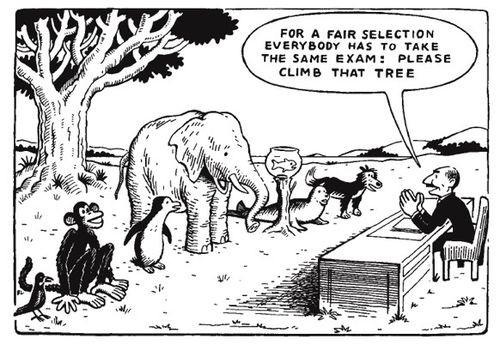Philosophy of Education

Lots of K-12 students in the United States, perhaps even you, wake up to alarms set way too early, roll out of bed to catch busses 🚌 that are way too smelly, and then sit through up to seven periods of school. The typical period consists of listening to teachers talking about things that students “have” to know for tests. This is a prime example of essentialism, the most popular education philosophy in the U.S. Essentialism is a teacher-centered approach that revolves around teaching students the “essentials,” or content that society deems necessary to become a contributing member.
But have you ever been in a classroom that was different, where the teacher didn’t lecture very much at all? Maybe instead you’ve been in a discussion-based class? And not just one where that one guy talks all the time. (You know the one we’re talking about.) Or a class where you learned through discovery? This is becoming increasingly popular in what are called learner-centered classrooms. The teachers make the classroom into a democratic environment, where collaboration and interaction are encouraged. Additionally, this often promotes critical thinking 💭 skills.
These approaches date back to John Dewey in the 1800s, and even further, to Plato in 300 BCE. Socrates, Plato’s teacher, was pretty radical and thought that learning happens when you answer questions and think for yourself which, unfortunately for the people of Athens, turned into him running around and shouting questions at people 📣. Dewey was one of the first known philosophers to advocate for kinesthetic classrooms. He thought that teachers needed to feel investment in their student’s lives, abilities and future and then find ways for the students to invest in their own education.
Videos
5 Educational Philosophies
Dan Krutka
-
 5 Educational Philosophies
5 Educational Philosophies
-
 Perennialism: Overiew & Practical teaching Examples
Perennialism: Overiew & Practical teaching Examples
-
 The Aims of Traditional and Progressive Education
The Aims of Traditional and Progressive Education
Key Texts
-
Some Thoughts Concerning Education
John Locke -
The Republic
Plato -
Dare the School Build a New Social Order
George Counts -
Summerhill: A Radical Approach to Child Rearing
A.S. Neill -
The Public School and the Private Vision: The Search for America in Education and Literature
Maxine Greene -
The Crisis of Education
Hannah Arendt
Pop Culture Examples
Want to Know More?
-
Philosophy of Education
Stanford Encyclopedia of Philosophy -
Cult of Pedagogy
Jennifer Gonzalez -
Education’s Blunt-Object Epistemology
Gary Chapin -
Plato on Education
Mark K. Smith -
Philosophies of Education: 2 Types of Teacher-Centered Philosophies
Matthew Lynch
Questions to Think About
-
Should students or parents have a say in what type of teacher they would like to learn from (progressivist, essentialist, social reconstructivist, etc.)?
-
If students are not listening to a lecture, then do they still learn content?
-
Does focusing education on teaching morality mean that students are just learning what their teachers think?
-
What are the most important goals for education?
-
What should students learn in school?
Key Thinkers
-

John Locke
-

Plato
-

Horace Mann
-

John Milton
-

Nel Noddings
-

John Dewey
-

George Counts
-

Carter Woodson
-

Angela Davis
-

Mary Wollstonecraft
-

Maxine Greene
-

Hannah Arendt
“File:John Locke. Line engraving by G. Vertue, 1738, after Sir G. Wellcome V0003651.jpg” by Wellcome Library, London is licensed with CC BY 4.0. To view a copy of this license, visit https://creativecommons.org/licenses/by/4.0. https://commons.wikimedia.org/w/index.php?curid=36403225
“File:Bust of Plato, Vatican Museum, Rome.jpg” by Dudva is licensed with CC BY-SA 4.0. To view a copy of this license, visit https://creativecommons.org/licenses/by-sa/4.0. https://commons.wikimedia.org/w/index.php?curid=64206678
“File:Horace Mann HoF jeh.jpg” by Jim.henderson is licensed with CC0 1.0. To view the terms, visit http://creativecommons.org/publicdomain/zero/1.0/deed.en. https://commons.wikimedia.org/w/index.php?curid=12393427
“John Milton” by Stifts- och landsbiblioteket i Skara is licensed with CC BY 2.0. To view a copy of this license, visit https://creativecommons.org/licenses/by/2.0/. https://www.flickr.com/photos/63794459@N07/6519991541
“File:Nel Noddings.jpg” by Jim Noddings, Nel Noddings’ husband is licensed with CC BY-SA 4.0. To view a copy of this license, visit https://creativecommons.org/licenses/by-sa/4.0. https://commons.wikimedia.org/w/index.php?curid=39663521
“MM0001595E” by Florida Keys–Public Libraries is licensed with CC BY 2.0. To view a copy of this license, visit https://creativecommons.org/licenses/by/2.0/. https://www.flickr.com/photos/97623182@N00/4690835933
“ILGWU President David Dubinsky, Vice Chairman of the Liberal Party and a member of the Administrative Committee; Eleanor Roosevelt; former Govenor Herbert H. Lehman, John L. Childs, Chairman of the Liberal Party of NY State; Pearl L. Willen, Chairman; and” by Kheel Center, Cornell University Library is licensed with CC BY 2.0. To view a copy of this license, visit https://creativecommons.org/licenses/by/2.0/. https://www.flickr.com/photos/38445726@N04/5278849591
“File:Berea College 20130110 CarterGWoodsonCenter AC(014) (20145454124).jpg” by IMCBerea College is licensed with CC BY 2.0. To view a copy of this license, visit https://creativecommons.org/licenses/by/2.0. https://commons.wikimedia.org/w/index.php?curid=58297084
“Enclosures: Quotidian Carceralities in the US and Occupied Palestine (Angela Davis)” by Columbia GSAPP is licensed with CC BY 2.0. To view a copy of this license, visit https://creativecommons.org/licenses/by/2.0/. https://www.flickr.com/photos/38426037@N04/15255790824
“Mary Wollstonecraft” by edenpictures is licensed with CC BY 2.0. To view a copy of this license, visit https://creativecommons.org/licenses/by/2.0/. https://www.flickr.com/photos/10485077@N06/44431453110
“Hannah Arendt (Oct. 14, 1906 – 1975)” by G4GTi is licensed with CC BY 2.0. To view a copy of this license, visit https://creativecommons.org/licenses/by/2.0/. https://www.flickr.com/photos/41634028@N07/6246088123
Key Terms
-
- Essentialism
- A teacher-centered philosophy that is popular in the United States and revolves around teaching basic content that society has proven necessary to adult life.
-
- Perennialism
- A teacher-centered philosophy that revolves around teaching the “great works,” sometimes includes religious content.
-
- Progressivism
- A learner-centered philosophy that focuses on developing students’ morals.
-
- Constructivism
- A learner-centered philosophy that revolves around shaping students’ world-views
-
- Democratic Environment
- A society-centered classroom environment where interaction and collaboration are encouraged.
-
- Humanism
- A learner-centered philosophy that revolves around fostering student potential.






